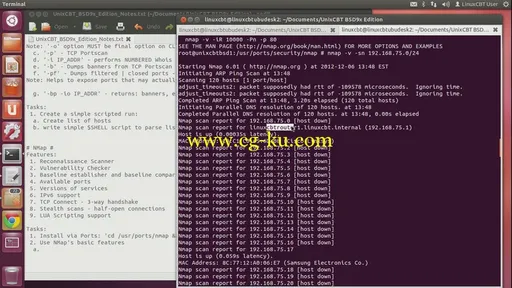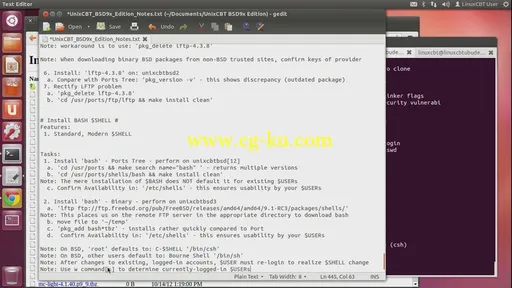
Linux CBT - UnixCBT BSD9x Edition
MOV | AVC 418kbps | English | 1358x766 | 5fps | 16 hours | AAC mono 65kbps | 2.35 GB
Genre: Video Training
Berkeley Software Distribution (BSD, sometimes called Berkeley Unix) is a Unix operating system derivative developed and distributed by the Computer Systems Research Group (CSRG) of the University of California, Berkeley, from 1977 to 1995. Today the term "BSD" is often used non-specifically to refer to any of the BSD descendants which together form a branch of the family of Unix-like operating systems. Operating systems derived from the original BSD code remain actively developed and widely used.
Introduction | Features | Installations
Explore features of FreeBSD
Obtain appropo installation images
Perform standard installation
Obtain minimal boot images
Execute Internet installation
Discuss Intranet installation applications and benefits
Synch Base System to local Web Instance
Perform Intranet installation
Evaluate results
Post-Installation Exploration and Checks
Peruse Console dump
Confirm kernel hardware environment via 'dmesg' logs
Check allocated storage
Confirm hostname configuration
Identify IP configuration
Ensure proper name resolver(s) are configured
Explore IP re-configuration as an alternative
Identify and discuss Key BSD Files
Evaluate accordingly
Package Management - Ports | Packages | Updates
Discuss available package management facilities
Explain Ports applications
Peruse Ports environment
Install Ports and confirm accordingly
Discuss Port Audit applications
Install Port Audit on various targets
Attempt to install Ports post Port Audit and evaluate
Remedy Port Audit discrepancies where applicable
Discuss PortSnap applicability
Install PortSnap on various targets
Update Ports Trees as needed with PortSnap
Discuss pros and cons of Binary Packages
Install Binary Package as needed
Confirm ALL installed packages: Ports and Packages
Evaluate results
Unix Basics - Users - Permissions - Symlinks
Explore User | Group management with BSD Tools
Provision users | groups as needed on various targets
Manipulate provisioned objects using standard tools
Explore standard Unix File System Permissions
Apply common permissions to various objects
Test accessibility and debug accordingly
Discuss features of Symbolic Links
Implement Soft Links as needed
Confirm Soft Link behaviour | limitations
Implement Hard Links as needed
Contrast Hard | Soft Links
Consider applicability of various linking mechanisms
Evaluate results
Storage Management - GPART | GrowFS | SWAP
Discuss traditional BSD storage management facilities
Highlight limitations of various models
Introduce the attributes of GPART
Use GPART to dynamically provision partitions
Overlay File Systems as needed
Test storage of content
Backup | Restore Partition metadata
Extend existing partitions as desired
Re-provision File System overlays as needed
Discuss partition extension caveats
Evaluate results
Systems Management Basics - Kernel Environment | Client Tools | Cron
Explore standard BSD kernel environment
Highlight important files
Identify supported kernel options
Discuss loadable module support
Explore common client resolution tools
Use key network client tools to ascertain information
Explore system scheduler configuration
Provision scheduled item and monitor
Evaluate results
Log Management | Consolidation - Syslog | Newsyslog
Discuss available facilities
Explore standard Syslog configuration
Consolidate Syslogs across target BSD instances
Confirm log consolidation
Explore log rotation mechanism
IP Configuration and Management
Discuss available facilities
Explore default per-installation configuration
Oscillate between static and dynamic configurations
Provision multiple IP addresses across hosts
Debug routing issues as encountered
Standardise IP configuration based on logical per-host model
Evaluate results
Application Services - Unix|Apache|MySQL|PHP (UAMP) - Web Application Services
Implement Apache Web Server
Examine httpd.conf file directives
Implement virtual directories using Apache and symbollic links
Implement Redirects using Locate and various Apache directives
Configure virtual hosts bound to the primary IP address and port
Configure virtual hosts bound to alternate virtual IP addresses and ports
Implement Apache logging system per virtual host
MySQL Relational Database Management System
Install MySQL Relational Database Management System
Secure access to MySQL
Explore MySQL Terminal Monitor Client
Create sample MySQL database
Install PHPMyAdmin for web-based management of MySQL instances
Explain & Secure access to PHPMyAdmin
Explore PHPMyAdmin's interface
PHP Integration
Discuss features and benefits
Build PHP support
Integrate PHP with MySQL
Troubleshoot integration issues
Re-build to enable various support
Confirm PHP applications support
Reconnaissance Tools
Install Dmitry Information Gatherer
Use Dmitry to query various targets
Evaluate information gathering features of Dmitry
Install current version of NMAP
Identify commonly used NMAP options/switches/parameters
Perform default TCP SYN-based ethical scans of local and remote resources
Explain typical TCP handshake protocol while using NMAP
Perform default TCP Connect-based ethical scans of local and remote resources
Identifiy key NMAP configuration files
Use NMAP to perform operating system fingerprinting and versioning
Peform subnet-wide ethical scans


发布日期: 2015-05-11